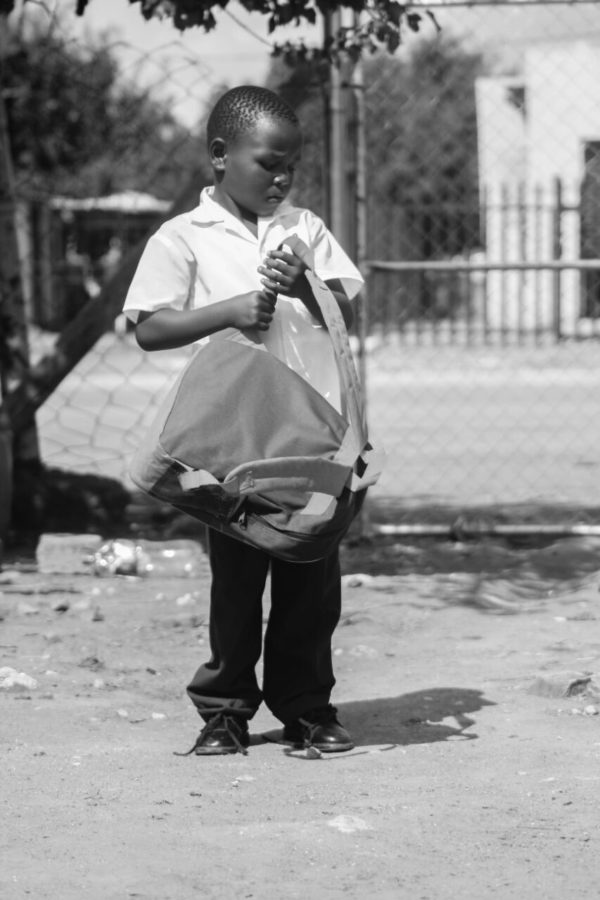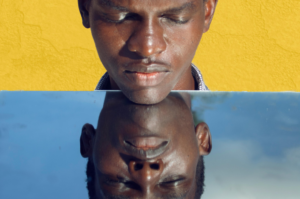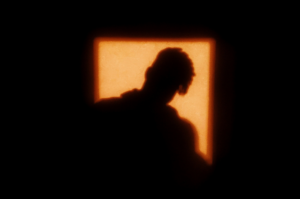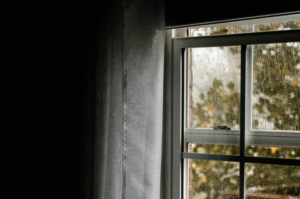
THERE IS NO need to see the sun in these intense blue skies. It is foreboding, ominous and could be felt; it is in the air. Bright as a firefly, today is a sultry afternoon in the dusty streets of Hani Park – an informal settlement founded in 1993 following the murder of struggle stalwart, Chris Hani.
Dwelling in these squatter camps made of collided and erected tin shacks are residents hailing from the rural areas of Lesotho, the Transkei and Mozambique. All arriving with the hope of securing employment in the surrounding mines of what was once the thriving City of Gold, Welkom.
Today, all of the mines have closed, the riches flown back to Europe and the Americas, leaving residents of Hani Park only with broken hopes and shattered dreams – kept to the outskirts of the city, the margins of society. The city itself is haunted; surviving are vultures, businessmen feeding off the carcass of what little remains in this ghost town.
Today is the 15th of January, 12 years since Hani Park’s inception. It’s the first day of school following end-of-year holidays.
Walking down the grimy street, under the basking, raging sun is an 11-year-old boy from school. His pair of school shoes is full of dust from kicking a ball made of the plastic bags, which the bread from a feeding scheme comes in.
He is walking slowly, winded and out of breath. His heart is beating frantically as though it wants to break out of his ribcage: he has just stopped running from a dog that chased him when he passed a yard down the street. His powder blue shirt is darker around his armpits, sweaty. His socks, hanging terribly off his legs, look tired too. His name is Freedom, born in 1994.
Freedom kneels next to a puddle. It rained last night, though today it is hot as if it did not. He reaches his hand into his pocket for his red handkerchief, a cloth made out of his old Superman t-shirt. He kneels to clean his shoes before he gets home, he is a few shacks away. His mother will give him a beating if she finds out that he played soccer with his school shoes.
His shoes are shining again. He smiles. He is pleased. Standing up, he sees a reflection of his teeth in a puddle. His dark chocolate face is visible; he is wearing a shirt matching the blue skies. In his reflection, he cannot see his small ears. Maybe, his ears are permanently pasted on the back side of his head, he thinks, because he sleeps with his hands covering them.
Walking again. Now concerned with his looks, triggered by this reflection. He knows he is good-looking, even though in his class, he was admired by none. Maybe it’s because of a scar beneath his left eye.
Walking through erect branches of trees, rusty steel poles and silver fence, he opens a gate. Their shack is 10 metres from the fence, their yard is relatively small. Their shack has different colours of zincs: blue, red and silver. The door is made of zinc too. Surprisingly, a locked chain is hanging on the zinc – the door is locked. He kneels again. This time to reach for a key under a tyre-mat outside their door, its hiding place when there is no one home. Maybe his mother went to bet fafi, he thinks.
As he walks into the shack, he is welcomed by an unpleasant smell of a foot odour coming from the gumboots lying on the ground. They belong to Thulo, whom he addresses as uncle – a general term in the neighbourhood for every stepfather. Thulo must be his third uncle since the passing of his father, who died ten years ago at the mines – struck by an underground rock. Thulo also works at the closed shafts of the mines. He mines gold illegally – locally he is called a Zama Zama by those who respect his hustle but tweba, rat, by those who mock him. Thulo is from Lesotho. Freedom does not know of his age. Thulo listens to horrible music and he is a drunkard. Three of them: Thulo, Freedom and his mother live in this two-room shack: one bedroom and a kitchen.
Freedom’s mother is an unemployed 30-year-old Xhosa woman hailing from the Transkei. She is surviving with a government child support grant of R200 a month. She is also supported by Thulo, and sometimes, she wins fafi.
Freedom waits for his mother. An hour has passed. Thulo has also not arrived. Freedom is now hungry. He walks barefooted, making slippery sounds on the vinyl floor. He finds two slices of bread inside the cupboard. He feeds on them. To quench his thirst and lubricate his dry bread, he gulps on a glass of water with a dash of five teaspoons of sugar. He is content. Not that he is full, but sugared water is his favourite drink. Since he is home alone, he puts five teaspoons. He is happy, smiling naughtily.
His reflection appears again. In the mirror in the bedroom divided by a transparent curtain that is now hanging and folded like a rope from the roof to the floor. His reflection makes him ponder on his looks again. His naughty smile vanishes. No one desires me, he thinks. Unlike other boys, no girl has kissed him on a cheek after school. Nor has he held hands with anybody other than his mother. He now suspects it’s due to his poor living condition – wearing the same shirt every day, his pants stitched on the buttocks, his dry uncombed hair, and his everyday smell of fire for there is no electricity at home. Maybe it is because of the scar, he thinks, hiding his left cheek from a mirror. A tear drops from his left eye, moving slowly down his check until he can taste a salty liquid entering his mouth. He wipes it and sits on the bed. He grabs a magazine. Engrossed, absorbed, almost entranced, he glides through Mad and Eve’s cartoon section. He is pouring himself into these pages. He is almost cross-eyed, the words merging into nonsense. He falls asleep.
Three hours later, he wakes to chatter in the house. His mom and her lover are talking, not having a quarrel or whispering. Maybe it was the music playing on the little radio that made them raise their voices, he thinks. Thulo is sitting in a corner, adjacent to his current sleeping corner and facing the door. His mother is dishing dinner on the table. It smells like tomatoes. His mother lands a plate on Thulo’s lap. On the floor, there is a bottle of Black label – his favourite beer. He does not look drunk. But Freedom is convinced it’s beer, hence the noise.
He thinks to himself, This bottle! Will it make me close my ears again? Not tonight. God please. I am exhausted!
All eating. The adults sit at a small table – Freedom on the floor with his little plate and a cup of cold water, now with a dash of two teaspoons of sugar. His mother and her lover continue speaking as though Freedom is not present. They are both talking at each other at the same time, without seeming to hear each other, each seeming to be in a private conversation with themselves. He thinks, Did she manage to buy a plastic cover for my books? I can’t go to school tomorrow with bare books again. Teacher is going to interrogate me.
He does not bother to ask her. Their conversation has gelled but with more complaints.
“It has been a week since you brought groceries home,” she says.
He responds: “I told you there are security guys camping at the shaft.”
“You should make a plan – like a man, as you managed to get yourself alcohol.”
He does not respond. They are both quiet. But he looks angrier. Now the artist singing in Sesotho on the tape recorder has found his voice in this silence. Le bitla le nkemetse, the grave awaits.
She has finished eating, he has not but he pours the remains into Freedom’s plate.
“I am full,” says Freedom, pushing his plate from his lap. He hates Thulo’s leftovers when he is drunk, he spits a lot when he speaks and refuses to wash his hands. Freedom has lost an appetite.
“Go throw them into the bin,” instructs his mother. He opens the door; the unlocked chain makes an unpleasant sound as it continuously clashes against the zinc door.
There are kids singing in the corner. He waits outside a bit longer to sing along. In this darkness, he cannot see them but can recognise their voices. The loudest is Thabo, his neighbour. If only his mother could allow him to walk around the neighbourhood at this time, he thinks, or if Thulo could turn his tape recorder off, he would hear from the inside of his home. Thabo’s signature high-note singing breaks through the nail holes of each zinc, surpassing any shack’s tolerance to noise.
He returns minutes later. His mother has made a bed for him on the kitchen floor with a mattress and a blanket. He crawls into his bed. She turns off the light, a paraffin lamp. In the darkness and silence, he thinks about today’s encounters: playing soccer, his first day at school this year, being chased by the dog. In this darkness, he can feel his cheeks move as he smiles. He falls asleep.
He dreams of Mpho, a girl he has liked since first grade. She has a beautiful smile and a soft voice. But he has never exchanged words with her nor looked her in the eyes when she was looking. She was nice but did not desire him. She looked at him as though she pitied his shabby clothes that the other boys always mocked him for. In this dream, Mpho gives him a kiss on the cheek while holding his hands after school.
When Freedom wakes up, his mother is screaming. She is wailing, she is grunting. She is sobbing along to the sound of slaps and punches. He sticks his fingers in his ears and waits. He remembers the last time, two weeks ago on New Year’s Day, when he walked in on Thulo beating his mother. “You are going to kill her. Stop it. Leave my mother alone!” he had shouted, throwing plates and pots at Thulo who was on top of his mother, punching hard. He hit him with a zinc mug on a head. Then Thulo charged back to him with a slap that left his eye swollen and his left cheek bleeding.
With a scar on his face, he was not allowed to leave the house for the following two weeks, until this morning when he left for school. With his fingers in his ears he cannot hear anything. He is alone. He is alone with his thoughts, ignorant to everything. Solace in darkness, an escape.
About the Author:
 Sobantu Mzwakali is an activist-writer based in Cape Town, South Africa. He has a passion for writing. He is an avid reader and a coffee connoisseur. When he is not reading or writing, he is appreciating his coffee’s finish with a burnt or tobacco flavour—a resonant silence at the end of each mug! His non-fiction writing has appeared in Open Democracy, Daily Maverick and Daily Vox. His blog can be read here. He tweets at @SobantuMzwakali
Sobantu Mzwakali is an activist-writer based in Cape Town, South Africa. He has a passion for writing. He is an avid reader and a coffee connoisseur. When he is not reading or writing, he is appreciating his coffee’s finish with a burnt or tobacco flavour—a resonant silence at the end of each mug! His non-fiction writing has appeared in Open Democracy, Daily Maverick and Daily Vox. His blog can be read here. He tweets at @SobantuMzwakali









Freedom | Fiction | Sobantu Mzwakali April 10, 2018 04:46
[…] This short story was first published on Brittle Paper […]